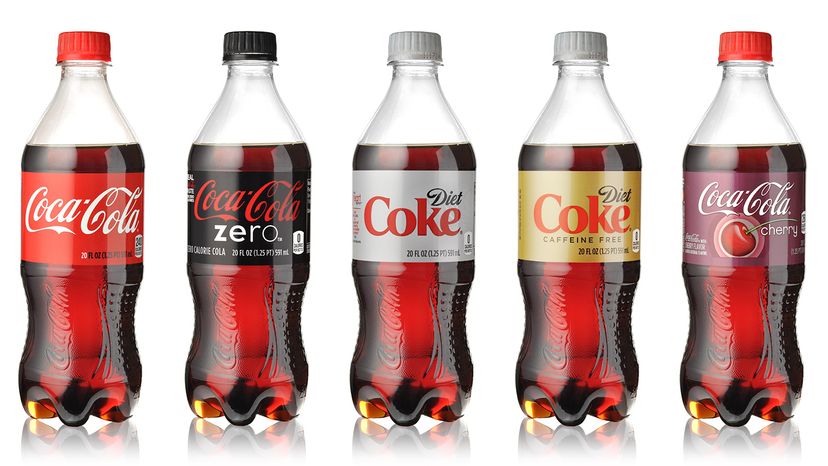
If you love Coca-Cola but you're trying to reduce your sugar intake, you've probably wondered about the merits of Diet Coke vs. Coke Zero.
Let's break down the differences between these two drinks.
Advertisement

If you love Coca-Cola but you're trying to reduce your sugar intake, you've probably wondered about the merits of Diet Coke vs. Coke Zero.
Let's break down the differences between these two drinks.
Advertisement
The ingredients in Diet Coke and Coke Zero are almost identical — but not quite. Diet Coke's ingredients are:
In August 2017, Coke Zero rebranded with a new recipe and a new name: Coke Zero Sugar. Coke Zero Sugar's ingredients are:
Advertisement
Diet Coke and Coke Zero Sugar also contain phenylalanine. Here's what we can learn from the ingredient labels of Diet Coke and Coke Zero Sugar.
Both Diet Coke and Coke Zero Sugar list carbonated water and caramel color as the first and second ingredients, respectively. This means that the main ingredients in both drinks are water (pressurized with carbon dioxide) and food coloring.
Aspartame is the third ingredient in Diet Coke and the fourth ingredient in Coke Zero Sugar, which means Diet Coke probably has a little more aspartame than Coke Zero Sugar. Coke Zero Sugar contains two artificial sweeteners: aspartame and acesulfame potassium.
Aspartame is an artificial sweetener that tastes up to 200 times sweeter than sugar. If you want to try aspartame, open one of the little blue packets of Equal next time you're at a diner.
Phosphoric acid is the fourth ingredient in Diet Coke and the third ingredient in Coke Zero Sugar, so Coke Zero contains slightly more phosphoric acid than Diet Coke.
According to Britannica, "it serves as an acidic, fruitlike flavoring in food products." Phosphoric acid is also used in fertilizer and water treatment.
Potassium benzoate is the fifth ingredient in both Diet Coke and Coke Zero Sugar. According to the National Library of Medicine, potassium benzoate is "a fungistatic [inhibits the growth of fungi] compound that is widely used as a food preservative."
The ingredient labels of both Cokes state the function of potassium benzoate is "to protect taste."
Both Diet Coke and Coke Zero list "natural flavors" as their sixth ingredient.
The U.S. Food and Drug Administration (FDA) defines natural flavors as "derived from a spice, fruit or fruit juice, vegetable or vegetable juice, edible yeast, herb, bark, bud, root, leaf or similar plant material, meat, seafood, poultry, eggs, dairy products, or fermentation products thereof, whose significant function in food is flavoring rather than nutritional."
Basically, natural flavors are distillations or extractions of real food products, as opposed to artificial flavors, which are synthesized. What exactly is in these natural flavors we'll never know, but the Coca-Cola company describes the flavor of Diet Coke as "cherry and ginger lime."
Diet Coke's sixth ingredient is citric acid, while Coke Zero's is potassium citrate. Citric acid is the acidic component of citrus fruits like lemons and limes. If you've ever made homemade jam or other canned foods, you may have purchased citric acid at the grocery store. Citric acid is likely responsible for Diet Coke's lime flavor.
Potassium citrate is an alkalizing ingredient that makes soda taste less acidic. You may find Coke Zero has a more balanced flavor than Diet Coke.
Both Coke Zero Sugar and Diet Coke list caffeine as their final ingredient. Caffeine is a chemical stimulant with a bitter flavor. It is found naturally in coffee, tea and chocolate, and added to many other beverages.
Caffeine keeps you awake by blocking your brain's sleepiness (adenosine) receptors. Diet Coke contains 46 milligrams of caffeine per 12 fluid ounces (355 milliliters) while Coke Zero Sugar contains 34 milligrams of caffeine per 12 fluid ounces (355 milliliters).
For reference, the FDA says an 8-ounce (237-milliliter) cup of black tea contains 30 to 50 milligrams of caffeine, and the same amount of drip coffee contains 80 to 100 milligrams of caffeine.
Advertisement
The nutrition facts for Diet Coke and Coke Zero Sugar are almost identical.
Advertisement
The difference in ingredients means that Diet Coke and Coke Zero Sugar have different flavors.
The Coca-Cola Company describes Diet Coke's flavor as "feisty cherry and ginger lime." It says Coke Zero Sugar "tastes like a Coke, but with zero sugar and zero calories."
Advertisement
According to Coca-Cola Great Britain, "Coca‑Cola Zero Sugar looks and tastes more like Coca‑Cola original taste, while Diet Coke has a different blend of flavors which gives it a lighter taste."
Please copy/paste the following text to properly cite this HowStuffWorks.com article:
Advertisement